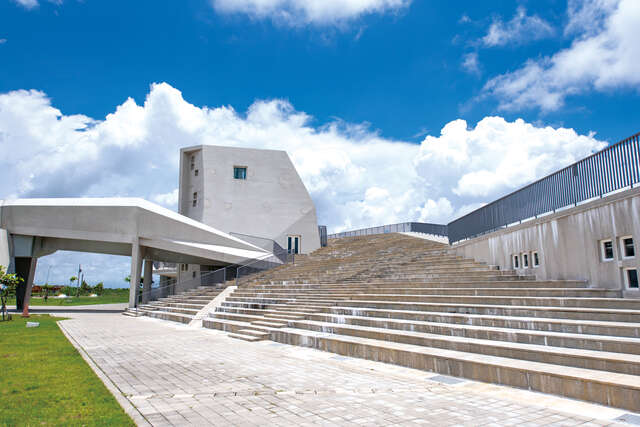Qigu Visitor Center Introduction
※The Sixth Island Trail is affected by tidal conditions; during high tide, the water covers the path and makes it inaccessible for visitors. To avoid tidal impacts on the visitor experience, you can check the tide schedule at the Central Weather Bureau of the Ministry of Transportation. The main structure of the Sih-ku Visitor Center is inspired by the concept of “dyke.” To reduce the visual disconnection caused by human architecture on the natural environment, local elements such as sea dykes, river dykes, and salt dykes were used in the design. The folded plate system transforms the “dyke” into space, resembling stacked salt blocks that form steep cliffs or gentle slopes after being weathered by rain, also reflecting the shape of valleys, embodying the natural forces acting upon the earth. The main structure features a gray-white color scheme, shining brightly against the blue sky, giving this “dyke” a diverse appearance at different times of the day. The architectural structure creates an image of a salt mountain landscape within the space, increasing compatibility between the building and the local scenery. This building symbolizes the unique natural landscape of the area and embodies the intention to protect the marine environment and highlight the beauty of the coastline. The Sih-ku Visitor Center serves as an information hub linking nearby attractions, becoming a new tourist landmark and providing a site for in-depth coastal tourism, offering friendly, diverse services to visitors. The charming water cottage at the Sixth Island is not only a hotspot for photos but also won the 2022 MUSE DESIGN AWARDS in the United States. The location of “Sixth Island” happens to be the sixth production area of the Sih-ku South Salt District during the Japanese colonial period 80 years ago, thus the name. This work is based on the changes in the salt industry of the Sih-ku Salt Field, interpreting the mindset of the residents who experienced the salt industry transitions and reflecting the lives of salt workers, transforming into a water installation art of an island and a cottage. It also incorporates the imagery of the early salt fields’ “salt windmills,” conveying a sense of spatial aesthetics of “quiet beauty.” Like a cottage on a lonely island, it changes its light and shadow throughout different times of the day, with the exterior “salt” color representing the natural elements of salt production: sunlight, seawater, and sea breeze. The work intentionally creates a fleeting opportunity to “land on the island,” as the water level in the scenic pool rises and falls with the tide; if the water level covers the path, it will not be open, allowing one to quietly admire the island cottage from the shore or check the tide table of Sih-ku before visiting. The environmental art installation at the Sih-ku Visitor Center - Sixth Island. Designer | Chen Yu-liang Location | Sih-ku Visitor Center Scenic Pool.








































